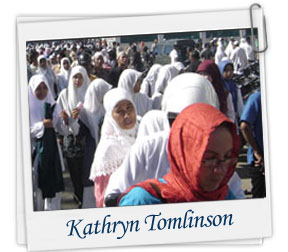 Kathryn has an undergraduate degree in anthropology from Cambridge University and studied the Meskhetian Turks, a displaced Muslim population in southern Russia, for her PhD at UCL. She is an independent researcher specialising in conflict and education, and is currently working for the Ministry of Defence.
Kathryn has an undergraduate degree in anthropology from Cambridge University and studied the Meskhetian Turks, a displaced Muslim population in southern Russia, for her PhD at UCL. She is an independent researcher specialising in conflict and education, and is currently working for the Ministry of Defence.
For my undergraduate degree I attended Cambridge University, initially studying Anglo-Saxon, Norse and Celtic. After a year and a half on this course I became frustrated with its purely academic nature and went in search of something with more utility. I chose to switch to anthropology and developed great enthusiasm for the subject. The focus at Cambridge was largely on academic applications of anthropology but I wanted to use the skills and knowledge it gave me in identifying and finding practical solutions to problems outside of the academic setting. My area of interest was international development - particularly in the field of conflict.
After graduating with a first class degree I moved to London, I fell into education research almost by mistake, with a job in the Student Support Department at Kingston University. I worked there as a researcher looking at the implications of top-up fees before being asked, at the age of twenty-one, to coordinate a commission on the future of the university. After a year at Kingston I started a PhD in social anthropology at UCL. Combining my interest in conflict with an interest in post-socialist societies – the result of taking an undergraduate module on this subject – I studied the Meskhetian Turks, displaced Muslims living in rural southern Russia. I spent a lot of time planting potatoes, milking cows and attending lots of weddings! It was a hard year but taught me a great deal about how different people deal with suffering. For me a PhD was again about accruing skills and a qualification which I could put to use in the real world. I wanted to do useful research that would really make a difference.
After completing my PhD I sought a post that would train me as a researcher able to use my skills for policy or practice change. so I joined the National Foundation for Educational Research, the UK’s largest independent education research institute. Here I worked as Senior Research Officer on national and international research projects related to inclusion of vulnerable people in education. In this role I learnt a lot about project planning and the practicalities of research, not covered during my PhD. In 2005 I left the NFER and moved to Aceh, Indonesia to be a volunteer for Peace Brigades International (PBI), providing ‘protective accompaniment’ and peace education to local activists. My work with PBI had a lot in common with PhD fieldwork in having to speak the local language fluently and meeting a wide range of actors, but combined this with team work and active involvement to support peace and human rights in the region. After this project ended I worked as Research Manager for the Commonwealth Education Fund (CEF), researching nationally appropriate funding models to replace this international advocacy fund. One of the projects included looking into the implications of the ‘war on terror’ for NGOs and the poor in India and the Philippines, and examining education planning in emergencies for UNESCO's International Institute for Educational Planning (IIEP).
I find my anthropological background frequently relevant in recognising the important of local context, and highlighting the complexity of issues. Anthropological theories and methods are becoming increasingly attractive in contexts as diverse as education, defense, development, health, museums and business. While many of us working out side the academy don’t necessarily identify ourselves as ‘applied anthropologists’ to our colleagues, I do feel an anthropology training is a fascinating preparation for addressing the complexities of the world. But not all departments know how to support would-be applied anthropologists looking to work outside academia, and people trained in anthropology still need to be creative in building their careers. Whichever career path you decide to take, anthropology can really broaden your view on the world and give you an understanding of how people’s differing perspectives are internally logical.
In 2003 Kathryn helped set up Apply, the Association of Social Anthropologists’ Network of Applied Anthropology. The network's website contains some fantastic examples of how anthropology has been applied in the contexts of education, development, health service research, museums and business.

